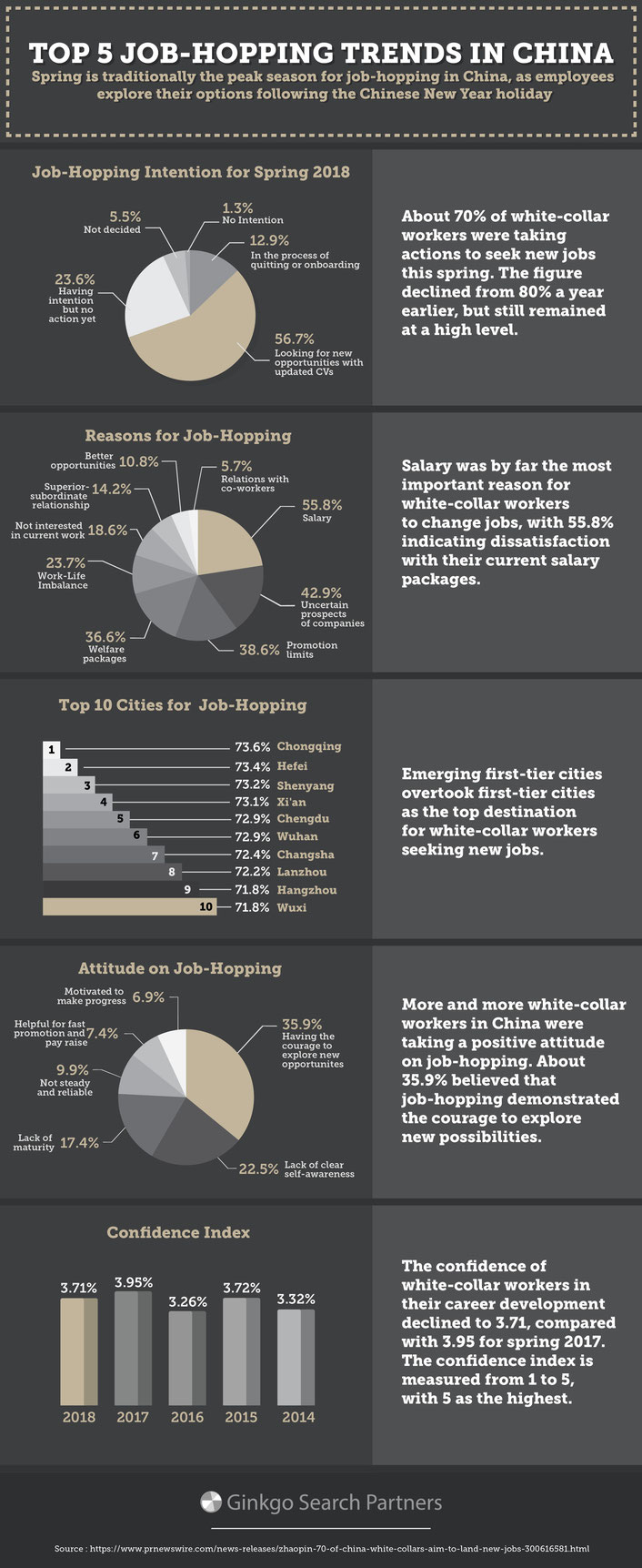
Once the Chinese New Year holiday is over, the phenomenon of job-hopping takes over the job market. Job-hopping is a tendency of professionals to seek jobs that best suit their needs and preferences. The current generation of white-collar employees in China will not keep a job just for the sake of having a job if they have a chance to get a position that provides better opportunities.
Apparently the young generation has a different perspective on their career development than did their parents and grandparents who were happy to keep a job if it provided a degree of financial stability and food on the family table. Today young professionals are looking for various perks, better salaries, and other advantages that make a new job more attractive.
The Chinese online career platform Zhaopin conducted a nationwide survey across 37 major cities with over 50,800 white-collar participants to take a closer look at China’s employment market and determine the recent job hopping trends in the country. Has the attitude to job-hopping changed over the years? And what are the driving factors of a career change? In the infographic below we have summarized the key findings of the study and identified the top 5 job-hopping trends in China to watch in 2018.
1.
70% of white-collar workers were open to new job opportunities
While it is true that their percentage dropped since 2017, the numbers are still high, as 70% of white-collar workers in China already started doing something that would get them a better job after the Chinese New Year holiday. Approximately 56.7% of them updated their resumes and were actively looking for new jobs, while 12.9% were in the process of quitting their current jobs or starting at a new employer.
2.
Salary remains the most important factor
There is always a reason behind the desire to change a job and 55.8% of white-collar workers in China indicated that the salary was the driving force. This shows that most employees are dissatisfied with their current salaries and happy to leave their current company for a better paid job. Besides an unsatisfactory paycheck 42.9% indicated that uncertain prospects at their current employer had a major impact on their decision and 38.6% stated that lack of promotion opportunities was a trigger for making them want to leave their jobs.
3.
Emerging first-tier cities are the new top destinations
If first-tier cities such as Beijing and Shanghai were among the favorites when it came to job-hopping, this year emerging first-tier cities such as Chongqing and Hefei occupy the first positions when it comes to the most desirable places to work in. The developing economy of these cities which create new work opportunities at a rather frequent rate is most certainly what draws job seekers. According to Zhaopin’s survey 33.2% of white-collar workers looking for new jobs are directing their attention to these emerging cities, compared to 32.7% preferring more established first-tier cities.
4.
Positive attitude to job hopping
An increasing number of white-collar workers in China showed a positive attitude to job-hopping. About 35.9% believed that job hopping demonstrated the courage to chase better opportunities and a way to find doors that will open the path to their desired lives. So it’s not that these workers are unhappy with their jobs. It is about exploring new possibilities and gaining new experiences.
5.
Confidence in career development has declined
In spite of positive attitude to job-hopping having increased, the confidence of white-collar workers about the development of their careers slightly dropped this year. So from 3.95 it dropped to 3.71 in the spring of 2018, which shows that people did foster some worries about the future of their professional lives. It is worth mentioning that this measurement is made on a scale of 1 to 5, 5 being the highest confidence point in this sector. So things are not looking bad at all as employees in China are still rather confident in their career development outlook.
RELATED INSIGHTS


